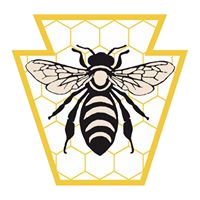Research
Analysis of Winter Loss Survey Data
Darcy Gray, a Master's student in Christina Grozinger's lab at Penn State, has been working with Christina and Sarah Goslee on an analysis of winter colony survival from past survey data. The Winter Colony Survival Analysis document summarizes results for the data from 2017-2021.
Penn State Research Articles
- The Role of Pathogen Dynamics and Immune Gene Expression in the Survival of Feral Honey Bees
- How viruses, immunity, and overwintering survival of feral honey bees compare to managed colonies
- A Quick Reference Guide to Honey Bee Parasites, Pests, Predators, and Diseases
- Summer weather conditions influence winter survival of honey bees
(References PSBA's own annual winter loss survey)
Tracking the Health of Feral Bees in PA

"Since 2016 the López-Uribe lab has been leading a citizen science project that aims to map and characterize the health status of feral bees across Pennsylvania." Read their full article.
Continuing Updates from the blog of the Lopez-Uribe Lab at Penn State
"Set-up for the COMB project is complete! The process of purchasing new equipment, irradiating used boxes, manipulating equipment to match the stakeholders' suggested protocols, organizing and distributing all the right items, and then setting them up for the bees was quite an undertaking! All told, 35 pallets of equipment were purchased and 5 pallets of used boxes were irradiated!"
Read the rest of the article on the blog.
Older blog entry:
"Because used equipment can carry on microorganisms to new colonies, we are irradiating older equipment for disease prevention...Preparing the equipment for transport and irradiation requires some effort and it is important to follow instructions for the successful completion of this protocol. Please check out our blog for information about how we prepped our equipment and what are the benefits of irradiation."
Varroa Mite research by Dr. Samuel Ramsey

Dr. Samuel Ramsey spoke at our 2018 fall conference. View the video he did on the same subject for the Danish Beekeeper's Association. Dr. Ramsey previously won the international Three Minute Thesis (3MT) competition for his thesis 'Varroa destructor: The Curious Case of the Bee Mite's Bite' (Video introduces new ideas on varroa destructor).
Pennsylvania Queen Bee Improvement
The goal of the Pennsylvania Queen Bee Improvement Program is to develop/breed honeybees that are: resistant to varroa mites and brood disease requiring little or no treatment, hardy with at least an 80% overwintering survival rate, gentle, and produce honey. Over the past several years PSBA members with help of PSU and USDA Sustainable Agriculture grants, have been evaluating different genetic stocks for their ability to survive Pennsylvania winters and other environmental stressors. Both beekeepers and queen-producers worked together on this project. Preliminary results are positive and PSBA wants to expand the field trials by seeking new participants.
The spirit of willingness to share their quality stock with others in order to move the breeding effort forward is a must. New participants should desire to improve Pennsylvania stock by evaluating either their current stock, and/or stock they receive from the program and by sharing of quality genetic stock with others. There are a variety of ways to share genetic stock either by distributing queens, virgin queens, queen cells, eggs/larvae frames for grafting or drone semen for artificial insemination.
"PA Queen Improvement Projects" 2016, Outreach / Field Day - East, was held on Saturday, June 18, 2016 at Meadow View Beekeeping, LLC in Bethel, PA.
In all, there were in excess of 40 people that attended. It was a beautiful day that saw a high temperature in the low 80's and featured bright sunshine with low humidity. There were (9) county clubs represented, many by their club's presidents. (60) 48 hour Purdue cells and countless grafts taken from (3) overwintered Purdue daughters that Mark Gingrich brought the day of the event. In addition, a colony that has overwintered (2) consecutive years in PA and an overwintered VP were available to graft from. The facility and refreshments were provided by Steve Finke. Mark Gingrich was the organizer of the event.
Charlie Vorisek held a similar event the same day in Linesville, PA in the north western corner of the state. The PA Queen Improvement Project co-chairs are Jeff Berta and Mark Gingrich.
Project Details (pdf)Queen Evaluation Sheet (xlsx)
Queen Evaluation Sheet (pdf)
Example Field Day Overview (pdf)
Example Field Day Timeline (pdf)
Breeder guidelines (pdf)
Breeder Participation Agreement (pdf)
2018 SARE Grant Study
Would you like to be part of history and participate as a 'Backyard Scientist' studying Purdue Leg Chewers? We are recruiting hobbyist beekeepers from our local bee clubs in several states.
Instructions for Participating
Application
Pesticides
List of chemicals, where they are commonly used, and the type of chemical (insecticide, fungicide, herbicide):
Pesticide List (Spreadsheet Format)
Pesticide List (HTML Format)
Informative Articles
"1-year Olds and Honey"
Read article (pdf format)
"Pollination Problems in Suburbia"
Read article (pdf format)
"Corn Dust Research Consortium Report"
Read article (pdf format)
"Common crop pesticides kill honeybee larvae in the hive"
Read article
Read article
"Nosema ceranae Escapes Fumagillin Control"
Read article
"Idiopathic brood disease syndrome and queen events as precursors of colony mortality..."
Read article
"Increased Resin Collection after Parasite Challenge: A Case of Self-Medication in Honey Bees?"
Read article
"A New Threat to Honey Bees, the Parasitic Phorid Fly"
Read article
"Iridovirus and Microsporidian Linked to Honey Bee Colony Decline"
Read article


